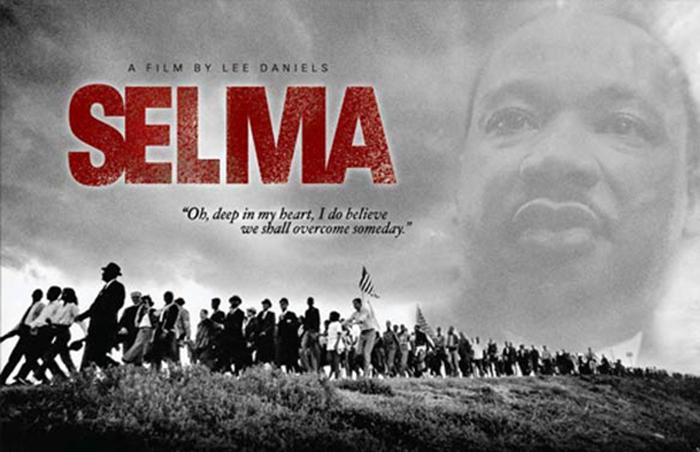A story of change in Selma, Alabama
The film “Selma” plays this weekend in the Woodland Theater
More stories from Brian Sheridan
Photo by SUBMITTED
It’s a story so powerful, you don’t want to believe it’s a documentary.
The film “Selma” is a documentary following Martin Luther King Jr.’s journey to receive equal voting rights through a momentous march from Selma to Montgomery, Alabama.
The first five minutes of the film are engaging to say the least. In only a few minutes director Ava DuVernay sets the tone for the rest of the movie, placing you into the lives of African American citizens during the 60s. This shows you the events and situations they underwent to vote just a half century ago.
By 1965, African American citizens had the right to vote. However, it was the corrupt behavior of white registrars that prevented any of them from actually getting registered.
Registrars would make them do extra requirements like recite the preamble of the constitution, know the number of county court judges and require them to name each one of them.
Obviously, hardly any of them were able to register.
The film captures the raw emotions of this time period and moves the audience with events and stories so outlandish and powerful, you forget this is a documentary of a real movement, with real people, that happened at actual places.
The documentary genre of movies in general can become stale if the story simply isn’t good enough to be a documentary. This was not the case for “Selma”. The African American suffrage movement was one filled with historic events and heroic protagonists almost too great to be true.
Half the story of this film is the life of Dr. Martin Luther King Jr. (David Oyelowo) and how his actions, speeches and presence rallied the black community to fight for equality. Oyelowo truly channels the essence of who MLK was as a human being, showing the great depth of his character.
MLK has to overcome many struggles throughout the film, like going to jail, protesting at the courthouse and raising the spirits of the black community after a person dies. Because of this, MLK gives many speeches. Many, many speeches.
His words have changed lives and brought great movements, obviously, but watching him have all these monologues with different people gets old pretty fast. Unfortunately, this comes with the territory of documentaries.
Throughout the film, you see the many different battles MLK faces. It wasn’t all on the streets of Selma, but it was also in the Oval Office trying to get President Lyndon B. Johnson to support the equal voting rights. It was at home with his wife, arguing about his risks on the frontlines.
When it comes to the protest march on Edmund Pettus Bridge in Selma, it plays out like a real battle with suspense, action and turmoil.
You have your good (MLK and followers), your evil (Selma county sheriff and police force), both waving their appropriate banners of war, American and confederate flag, respectively. And you have MLK’s voice, his speeches, the drums of war.
The events that play out from these protests in the film bring real emotions to the surface. I got angry when they were at the bridge and the courthouse. I felt so much satisfaction when the number of marchers grew.
Because of history, I know MLK makes it to Selma but you still watch at the edge of your seat hoping he makes it.
I want to believe the white community was overdramatized by Ava DuVernay, that they weren’t viciously beaten in the streets, that the sheriff, Jim Clark, or Governor George Wallace are some sort of make believe characters to play at the audience’s emotions.
Sadly, these people are real. Bloody Sunday is real. Those who died are real.
The story of Selma is a moving and exciting event from history. DuVernay pretty much had all her work done for her. She just needed to record it.
If you wish to watch how the events unfold and see one of the most significant movements of civil rights, “Selma” will be playing at 7 p.m. Oct. 9 and 10, and at 2 p.m. on Oct. 10 and 11 in the Woodland Theater.

